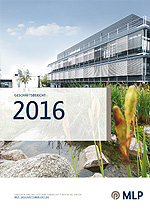ECONOMIC REPORT
Overall economic climate
Overall economic situation
The recovery in the eurozone continued in the reporting year. According to estimates provided by FERI Investment Research, economic growth for the eurozone was 1.5% in 2016 – and was thereby slightly below the previous year (2015: 1.9%). The expansive monetary policy of the European Central Bank was the key contributing factor to the recovery in the eurozone.
In Germany, growth in the last financial year continued to be bolstered by a comparatively robust domestic economy. In its autumn forecast, the German government stated the low oil price as another reason for the positive development. According to calculations performed by FERI, inflation-adjusted gross domestic product (GDP) in Germany increased slightly to 1.9% in 2016.
Consumer confidence stabilising at a high level at the end of the year
Consumers in Germany continue to display a highly positive attitude, as underlined by the Consumer Sentiment Index of the German Consumer Research Association (GfK). The Index stood at 9.8 points in December 2016, compared with 9.3 points twelve months earlier. In September 2016, it even surpassed the 10-point mark with 10.2 points. According to the study performed by the German Consumer Research Association (GfK), one reason for the very positive overall sentiment is the fact that consumers are displaying resilience to a range of risk factors, such as the result of the US election, the Brexit decision, the financial crisis flaring up again in Italy following the unsuccessful referendum and Renzi’s resignation from the government, as well as the ongoing threat of terrorism. In addition to this, the employment market remains solid and private household incomes are displaying good development. The Consumer Sentiment Index of the German Consumer Research Association (GfK) is considered one of the most important indicators of behaviour among German consumers and of economic stability.
The overall mood in the German economy remains positive. The recovery remained intact in Germany right to the end of the year. The ifo business climate index was unchanged in November 2016 at 110.4 points – having been at just 107.4 points in January 2016. In December 2016, it increased even further to 111.0 points – representing its highest level since February 2012.
Employment market development remains robust
The employment upturn in Germany continued in the reporting year. According to data published by Germany’s Federal Employment Agency, the annual average number of registered jobseekers fell by 104,000 year-on-year to approximately 2.7 million persons in 2016. The corresponding unemployment rate of 6.1% (2015: 6.4%) is the lowest level in 25 years. The employment market continued to offer opportunities for highly skilled employees. According to Germany’s Federal Employment Agency, the unemployment rate among academics remained very low at just 2.4%.
According to the German government, the healthy situation on the employment market led to significant salary increases. Indeed, net wages increased by 3.7% in 2016. According to data published by the German Federal Statistical Office, the disposable income of private households increased by 2.8%. The savings rate in Germany increased slightly in the last financial year, reaching 9.8% in 2016. It was 9.7% in 2015.

